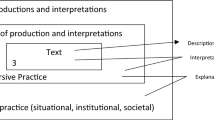Abstract
This paper analyses the way in which discourse and argumentation may vary depending on participants’ educational level and gender. Men and women from three different educational levels (literacy, advanced level and university students) participated in discussion groups that debated about women and work, the sharing of housework and the way in which girls and boys are educated. The results showed important differences depending on participants’ educational level and gender. In general, the main differences were related to educational level, while gender tended to interact with educational level, as a moderating factor.
Similar content being viewed by others
REFERENCES
Antaki, C.: 1994, Explaining and Arguing: The social organization of accounts, Sage, London.
Bernstein, B.: 1990, The Structuring of Pedagogic Discourse, Routledge, London.
Billig, M.: 1987, Arguing and Thinking. A Rhetorical Approach to Social Psychology, Cambridge University Press, Cambridge.
Billig, M.: 1991, Ideology and Opinions. Studies in Rhetorical Psychology, Sage, London.
Bohan, J.: 1993, Regarding gender: Essentialism, constructionism and feminist psychology. Psychology of Women Quarterly 17, 5–22.
Bruner, J.S.:1986, Actual minds, possible worlds, Harvard University Press, Cambridge, Mass.
Bruner, J.S.: 1996, ‘Meaning and self in cultural perspective’in D. Bakhurst and Ch. Sypnowich (eds.), The social self, Sage, London.
Cala, M.J.: 1990, El Programa de Educación de Adultos y el papel social de la mujer. Research Report supported by the Instituto Andaluz de la Mujer.
Cala, M.J., M. de la Mata, and Sánchez, J. A.: 1994, ‘Attitudes and values in women: An investigation into discourse in Adult Education’in J. V. Wertsch and J. D. Ramírez (eds.), Literacy and others forms of mediated action, Fundació n Infancia y Aprendizaje, Madrid.
Cala, M.J.: 2002, Género, grado de escolarizació n y actitudes. Modos de argumentar y pensar. Cultura y Educación 14(3), 327–342.
Camps, A. and Dolz, J.: 1995, ‘Enseñar a argumentar: Un desafío para la escuela actual’. (Introduction to the issue ‘Enseñar a argumentar’). Comunicación, Lenguaje y Educación 25, 5–8.
Cole, M. and Scribner, S.: 1974, Culture and thought: A psychological introduction, Wiley, New York.
Crawford, M.: 1995, Talking Difference. On Gender and Language, Sage, London.
Cros, A.: 1995, ‘El discurso académico como un discurso argumentativo. El argumento de autoridad en la primera clase de un curso académico’Comunicación, lenguaje y Educación 26, 95–106.
Dolinina, I.B.: 2001, ‘Theoretical and Empirical Reasoning Modes from the Neorological perspective’Argumentation 15, 117–134.
Gilligan, C.: 1982, In a different voice: Psychological theory and women's development, Harvard University Press, Cambridge, Mass.
Harding, S.:1993, The Science Question in Feminism, Cornell University Press, New York.
Hare-Mustin, R. T. and Marecek, J.: 1988, The Meaning of Difference. Gender Theory, Postmodernism and Psychology. American Psychologist 43(6), 455–464.
Hare-Mustin, R. T. and Marecek, J.: 1990, ‘Making a difference’in Rachel T. Hare-Mustin and J. Marecek (eds.), Making a difference. Psychology and the construction of gender, Yale University Press, London.
Hitchcock, D.: 1998, ‘Does the Traditional Treatment of Enthymemes Rest on a Mistake’?, Argumentation 12; 15–37.
Jonsen, A. and Toulmin, S.: 1988, The Abuse of Casuistry: A History of Moral Reasoning, University of California Press, Berkeley.
Perelman, C. and Olbrechts-Tyteca, L.: 1994, Tratado de la Argumentación. La nueva retórica, Gredos, Madrid.
Racionero, Q.: 1994, Notas a la Retórica de Aristóteles, Gredos, Madrid.
Ramírez-Garrido, J. D., M. J. Cala-Carrillo, and J. A. Sánchez-Medina: 1999, ‘Speech Genres and Rhetoric. The Development of Ways of Argumentation in a Program of Adult Literacy’in M. Hedegaard and J. Lompscher (eds.), Learning Activity and Development, Aarhus University Press, Aarhus.
Rogoff, B.: 1981, ‘Schooling and the development of cognitive skills’in H. C. Triandis and A. Heron (eds.), Handbook of Cross-Cultural Psychology, Vol. 4, Allyn and Bacon, Boston.
Scribner, S. and Cole, M.: 1981, The psychology of literacy. Harvard University Press, Cambridge, Mass.
Scribner, S.: 1977, ‘Modes of thinking and ways of speaking’in P. N. Johnson-Laird and P. C. Wason. (eds.), Thinking: Readings in cognitive science. Cambridge University Press, New York.
Tannen, D.: 1990, You just don't understand me. William Morrow, New York.
Tannen, D.: 1994, Gender and Discourse. Oxford University Press, Oxford.
Toulmin, S.: 1958, The Uses of Argument, Cambridge University Press, Cambridge.
Toulmin, S., R. Rieke, and Janik, A.: 1979, An Introduction to Reasoning, Mcmillan, New York.
Verbiest, A.: 1995, ‘Woman and the gift of reason’Argumentation 9, 821–836.
Vygotsky, L. S.: 1981, ‘The instrumental method in psychology’in J. V. Wertch (ed.), The concept of activity in Soviet Psychology, Sharpe, Armonk, New York.
Warnick, B. and Manusov, V.: 2000, ‘The Organization of Justificatory Discourse in Interaction: A Comparison Within and Across Cultures’Argumentation 14: 381–404.
Wertsch, J.V.: 1985, Vygotsky and the social formation of mind, Harvard University Press, Cambridge, Mass.
Wertsch, J.V.:1987, ‘Modes of discourse in the nuclear arms debate’Current Research on Peace and Violence 2–3.
Wertsch, J.V.: 1991, Voices of the mind. A sociocultural approach to mediated action, Harvard University Press, Cambridge, Mass.
Wertsch, J.V. and Minick, N.: 1990, ‘Negotiating Sense in the Zone of Proximal Development’in M. Schwebel, C. A. Maher and N. S. Fagley (eds.), Promoting Cognitive Growth Over the Life Span. Erlbaum, Hillsdale, N.J.
Wertsch, J.V.: 1998, Mind as Action. Oxford University Press, New York.
Author information
Authors and Affiliations
Rights and permissions
About this article
Cite this article
Carrillo, M.J.C., Benítez Maria, M.L.D.L.M. Educational Background, Modes of Discourse and Argumentation: Comparing Women and Men. Argumentation 18, 403–426 (2004). https://doi.org/10.1007/s10503-004-4906-1
Issue Date:
DOI: https://doi.org/10.1007/s10503-004-4906-1



